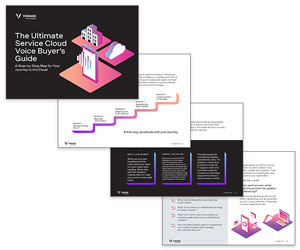Carlos Aragon at Vonage explores how AI is transforming contact centres by enhancing customer interactions, assisting agents in real time, and generating valuable insights, all while highlighting the importance of safeguarding customer data and maintaining privacy.
Today’s customers expect more than just a product or service. They demand seamless, personalized, and efficient interactions with businesses.
It’s no surprise that businesses are looking at artificial intelligence (AI) as a powerful tool to optimize contact centre interactions and enhance customer experiences.
It’s in the Data
Customers are ready for AI. How do we know? Our Global Customer Engagement Report 2024 uncovered the impact of customer experiences and how modern solutions like AI can solve them.
Long wait times, repetitive conversations, and unresolved issues cause frustration and impact loyalty. What’s more, after a bad experience, 74% of customers surveyed are likely to take their business elsewhere, and 46% only need one or two bad experiences to leave.
On the other hand, when presented with a great customer experience, 36% will purchase additional products. Here’s where AI comes in – nearly 80% of customers surveyed have recently used AI-assisted tools, and 60% of them have a positive attitude about using AI to improve customer experiences.
However, businesses should not rush to implement AI, or they may risk potential consequences. There are several class-action lawsuits against companies who allegedly allowed their contact centre vendor to leverage customer recordings and data to train their AI models. Therefore, it’s important to put the right safeguards in place when implementing AI.
The Value of AI in Contact Centres
Let’s look at how AI can be valuable in contact centres. AI can elevate customer experiences (CX) in the contact centre in three main areas: virtual agent capabilities, agent assistance capabilities, and analytics and insights.
Virtual Agent Capabilities
AI virtual assistants can automate routine tasks, provide instant responses, and offer personalized solutions. Using a virtual agent can reduce wait times and improve customer satisfaction. These voice- or text-based bots can handle multiple customer queries and provide self-service capabilities 24/7.
Virtual assistants can even integrate with Customer Relationship Management (CRM) systems and other business processes to automate tasks (e.g., order or delivery status, rescheduling of appointments, etc.).
They can also leverage Knowledge AI and Generative AI to tap into business knowledge bases (e.g., FAQs, customer support documentation, etc.) and generate responses to customer queries, using natural language understanding (NLU).
If the virtual agent cannot solve the customer’s issue or the initial query is considered complex, the interaction can be routed to a human agent. That’s when another form of AI takes over.
Agent Assistance Capabilities
Agent assistance capabilities operate like a co-pilot next to the contact centre agent. They provide real time transcription of the customer conversation, analyse customer sentiment, recommend next best actions (NBA), or recommend articles from a knowledge base.
They also leverage Generative AI to automatically draft responses to the customer, based on the available information, or generate a summary of the customer interaction once it has concluded.
Analytics and Insights
Finally, AI can analyse all the information and statistics collected to produce insights which allow contact centre administrators to identify trends with customers and agents, implement improvements, coach their agents, and even optimize their staff schedules.
AI can also be used to provide enhanced noise cancellation at both ends of a conversation for agents and customers.
This eliminates background noise and improves experiences, as well as the quality of the transcription, which is then the source for the rest of the AI capabilities used across the contact centre.
Leveraging AI Without Risking Data Exposure
Implementing AI solutions in the contact centre experience starts with choosing a solution that minimizes the risk of data exposure.
Businesses need to look for a contact centre as a service (CCaaS) vendor that is transparent about:
- the kind of data collected during a customer interaction
- where the data is stored
- how long the data is retained
- the customer’s ability to access and delete their personal data
The vendor should provide customer data privacy assurances, such as GDPR, PCI DSS, and HIPAA compliance, and industry-level security and data protection standards like ISO 27001 and SOC2 Type II, or Salesforce Shield certifications.
They should also guarantee all customer information and call recordings are stored securely within the contact centre or are transferred securely to a CRM tool.
Additionally, the right CCaaS vendor will also ensure that the customer information is not used to train AI models and is properly compartmentalized.
This ensures that a business using the CCaaS platform would be unable to access the customer data in the custody of another business.
The vendor should provide a list of all third-party vendors used in their solution that could potentially have access to the customer information, allowing businesses to make an informed adoption decision.
Informed consent is key. Customers need to know how their information is handled and have the choice to leave the interaction if they are not comfortable. It’s important for the CCaaS vendor to properly categorize the users in the system.
This ensures that permissions and privileges are properly assigned to administrators and supervisors, erring on the side of caution by minimizing access to certain types of information.
It’s also important to include disclaimers in terms and conditions, as well as in IVRs, web chats, or other systems customers use to interact with the contact centre, stating that the conversation is being analysed by AI.
Finding Balance Between Benefits and Security
AI has huge potential to transform contact centres, enhancing customer experience and increasing operational efficiency.
But it’s critical to find a balance between the benefits of AI technology and the need to protect customer information.
In this fast-paced world, bringing AI into the contact centre is no longer just an option but is a necessity to remain competitive. Businesses that can effectively leverage AI while ensuring data privacy will stand out in the market.
By choosing the right contact centre solution, businesses can improve customer satisfaction and build trust – both of which are essential for long-term business success.
This blog post has been re-published by kind permission of Vonage – View the Original Article
For more information about Vonage - visit the Vonage Website
Call Centre Helper is not responsible for the content of these guest blog posts. The opinions expressed in this article are those of the author, and do not necessarily reflect those of Call Centre Helper.
Author: Vonage
Reviewed by: Jo Robinson
Published On: 7th Apr 2025
Read more about - Guest Blogs, Vonage






 Vonage is redefining business communications, helping enterprises use fully-integrated unified communications, contact centre and programmable communications solutions via APIs.
Vonage is redefining business communications, helping enterprises use fully-integrated unified communications, contact centre and programmable communications solutions via APIs. 





























